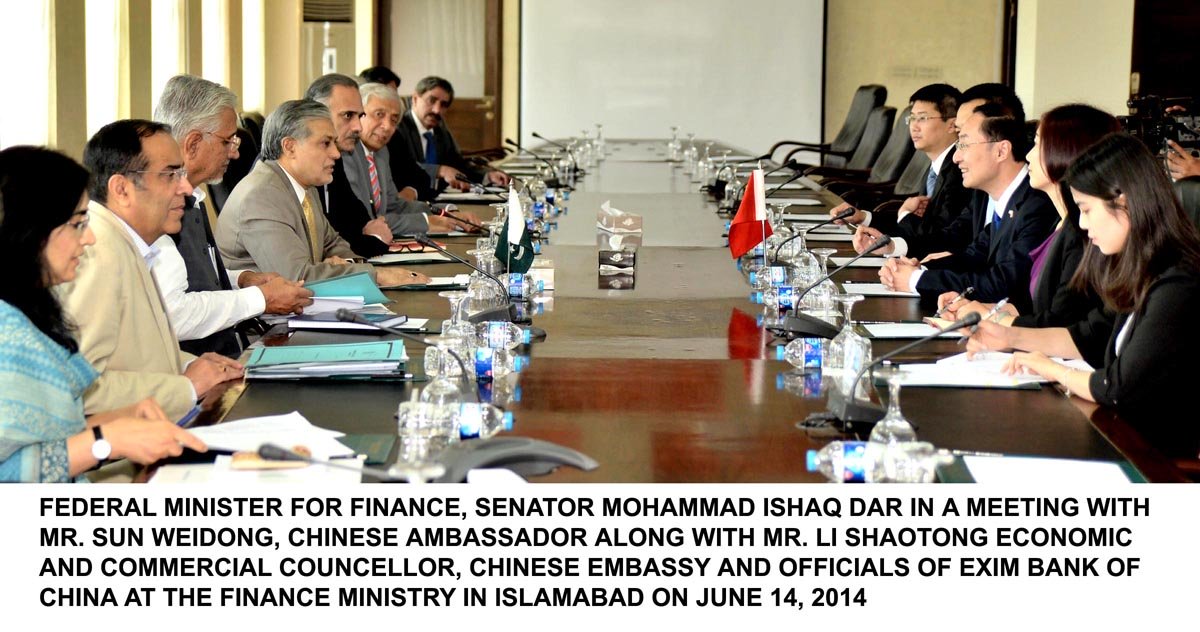
ISLAMABAD:
As a measure to ease the deepening energy crisis, Pakistan and China may soon establish a specialised company to construct the 1,100-megawatt (MW) Karachi coastal nuclear power project that would aid the work being completed on a fast-track basis.
The issue of setting up a Special Purpose Vehicle (SPV), a company being set up to achieve limited objectives, was discussed during a meeting between the Finance Minister Ishaq Dar and Chinese Ambassador to Islamabad, Sun Weidong, according to officials.
The meeting was also attended by Pakistan Atomic Energy Commission (PAEC) Chairman Ansar Pervez and Attorney General of Pakistan Salman Butt.

The officials said that China also agreed to release a loan tranche of $330 million for carrying out work on the project. The PAEC will build the power plant Karachi Coastal Power at an estimated cost of $9.5 billion or Rs958 billion with the help of Chinese assistance. Out of the total cost, China will provide a loan of $6.4 billion.
It will be the second mega project after Chashma 3 and 4 power plants, known as C3 and C4, which are also under way with the help of China. Beijing is providing $1.3 billion out of the total cost of $1.9 billion of C3 and C4.

In an attempt to increase power generation, Pakistan is turning its attention to producing nuclear energy on a relatively bigger scale. According to the Energy Security Action Plan, the share of nuclear power will be increased in electricity production by installing 8,800MW nuclear power plants by 2030.
Nuclear plants will provide electricity at cheaper rates compared to power produced from thermal sources. At present, the country is experiencing a widening gap between power supply and demand, leading to extensive outages that disrupt life and business and shaves 3% off economic growth annually.
For Karachi Coastal Power, the government has allocated Rs12.2 billion in the budget for the next financial year 2014-15, beginning July. The officials said both countries decided to set up a project specific company as the government cannot spare Rs100 billion to Rs125 billion each year out of the thin federal Public Sector Development Programme.
They added the rupee component will still be shown in the PSDP. However, it was not immediately clear whether the $6.4 billion loan will be the liability of the company or the Pakistan government.
The government has decided to adopt a fast-track policy for the implementation of the projects starting with the Chinese cooperation, an official handout of Ministry of Finance quoted Finance Minister Ishaq Dar as saying.
It added as the country was experiencing a gap between power supply and demand, there was a need for early completion of ongoing energy projects which can help tackle energy shortages.
Dar stated that that these efforts were not only creating attractive opportunities for Chinese investment but new avenues of employment and trade were also opening for the people of Pakistan.
The Ambassador discussed avenues for enhancing bilateral cooperation in various fields between the two countries and appreciated Pakistan’s plans for the development projects initiated by the present government, the handout stated.
Published in The Express Tribune, June 15th, 2014.
Like Business on Facebook, follow @TribuneBiz on Twitter to stay informed and join in the conversation.
COMMENTS (19)
Comments are moderated and generally will be posted if they are on-topic and not abusive.
For more information, please see our Comments FAQ



































































the way the water bottles are kept, they look like gunning each other.
"To meet energy needs: Pakistan, China to establish Special Purpose Vehicle"
Sorry - the title implied that they wanted to revive the 'Water Engine car'
China-Pakistan Economic Corridor would be set up, which may turn Pakistan into a hub of regional cooperation. Under this programme, China will make large investments in Gwadar Port, including setting up of an oil city. The two sides agreed to establish an interface between China's strategy to develop its western region and Pakistan's domestic economic development with a view to translate their high level political relationship into results of pragmatic cooperation. To this end, the two sides will strengthen cooperation in trade, investment, energy, agriculture, finance and other fields.
energy cooperation with China would help in meeting the energy crisis in Pakistan. Pakistan offered immense potential for trade and investment in diverse areas like energy‚ communication and infrastructure.
Pakistan need mega invesment Pakistan need do not need loan ...
If Karachi Coastal Nuclear power Project proposal was initially 67-33 % arrangement between Chinese and Pakistan Government. After budget our Fin Minister has spared only 12billion rupees per year out of required 100 billion rupees for next 3 years. Now as per new Special purpose Vehicle proposal both government will remain party in the same project not clear and Let see how much project funds will spare by our Chinese friends on SAME TARIFF. But on the same side $330M will be released soon means PAEC ready for this project without clarity on financing terms & conditions of the project. God save this country from Business community Political Government
We should strive to be self reliant.
China and Pakistan have always been good friends of each other, this friendship can be seen in history and in the present day as well where China as an emerging global power is extending its hands towards Pakistan in the field of sharing nuclear technology for the sake of making the country to get rid of increasing energy crisis. By this cooperation China has actually once again proved that it is the "all-weather friend of Pakistan. These nuclear power plants once get constructed and also operational would definitely make the electricity to be available at lower rates.
@Fuad: Yangjiang, Ningde, and Hongyanhe are 1,000MW nuclear power plants (in exactly 1,080). But other nuclear power plants in China that in service or under construction are above 1,000MW
China is the only true friend of Pakistan, Pakistan Govt must provide full security to Chinese people coming in Pakistan, as China investing huge projects in Pakistan..
Unless we make Karachi safe...no project is worth the risk....subsequent internal intel failures & lack of trained LEAs etc;...secure areas before going ahead.....whether you like it or not to hear...KANUPP is very much under the radar of TTP....do not be surprised.....but I hope I am wrong to assume this.
10Bn dollar is too expensive for Pakistan. Even if 6bn USD is taken as a loan, repayment will severely impact the current account! Pakistan will be better off with a smaller power plant, that it can afford! The best would be to invest in Solar power, where CAPEX cost is 1.5M USD per MW and Wind, which has a CAPEX of 2M USD per MW! Not sure how did planning commission compute the IRR for this project?
Can anybody give a reference of a 1,000 MW Nuclear Power Plant in China? There is none!! This will be the first experiment. Pak China Dosti Zinda bad
Why is Ishaq Dar wearing a Gemstone?I thought he was the FM of the Saudi Republic of Pakistan.
@Shah: What if the equipment turns out like the rail engines?
Merely allowing two way electric meters and duty free import of solar panels will dramatically reduce the the power generation gap but then how will these guys make Mega commissions from big deals?